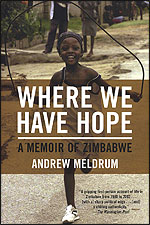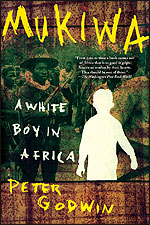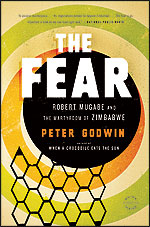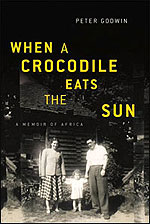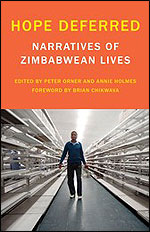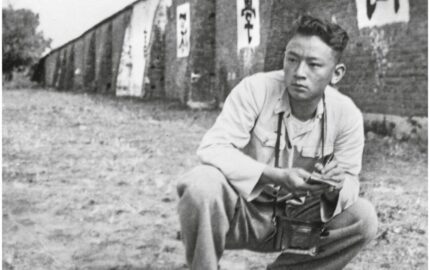All that has happened in Zimbabwe—including President Robert Mugabe's brutal oppression and the spirited challenge to his iron-fisted rule—provides compelling stories of suffering and success, torture and kindness, cowardice and bravery.
For years Mugabe has waged a relentless campaign to silence the press yet many journalists still manage to report the news. But the epic nature of Zimbabwe's struggle for democracy has compelled many journalists to write at greater length in books.
Reporting can be tough, if not impossible, in Zimbabwe. To convey events with accuracy, fairness and enough background and analysis so that readers understand the country's situation is as essential in writing nonfiction books as it is in daily journalism. But writing a book about Zimbabwe becomes a perplexing task: It is difficult to do justice to the complexities of Zimbabwe's story while still grabbing and sustaining readers' interest when so much of what reporters hear is depressing.
Authors who take on this task face another obstacle constructed by Mugabe. He has always depicted the country in stark terms of race—black vs. white. He asserts that Western, white journalists cannot tell Zimbabwe's story. They will, he contends, distort it to support the white minority who once ruled the country when it was Rhodesia. This is, of course, nonsense, but it is something that lingers nonetheless in the minds of many authors—as it did in mine—when writing about Zimbabwe.
When I wrote my book, "Where We Have Hope: A Memoir of Zimbabwe," I solved these conundrums by telling stories of the lives and circumstances of Zimbabweans. Although a memoir, my book was actually more about the Zimbabweans I came to know in my 23 years of reporting from their country. My time there stretched from it achieving independence in 1980 to 2003 when the government expelled me. So in my book, I was able to describe both the time when the country offered a beacon of hope as it moved from racial war to racial reconciliation and then the period when it descended into the steely grip of Mugabe and his ruling party, ZANU-PF.
Relying on my journalistic style of storytelling, I focused on those I'd encountered. Though their stories often told of terrible violence and repression, I worked to include compelling moments of the inspiring bravery, determination and humor that are so much a part of the Zimbabwean story—and leave the reader feeling some sense of hope about the future.
'The Fear'
In his recent book, "The Fear: Robert Mugabe and the Martyrdom of Zimbabwe," Peter Godwin tackles similar challenges to mine—and the result is gripping and, at times, enthralling. Godwin, a white Zimbabwean, is an accomplished writer and with a valid vision of his country. His first memoir, "Mukiwa: A White Boy in Africa," is a rattling great read about growing up in Rhodesia and coming of age in Zimbabwe. In his second, "When a Crocodile Eats the Sun: A Memoir of Africa," Godwin told more of his family's history in Zimbabwe, especially about how his father, a Jew who escaped from Poland, succeeded in passing himself off as British and raising his family in southern Africa, only to see it all turn to ashes as Zimbabwe crumbled.
"The Fear" is less about Godwin and more about Zimbabwe. As he travels through the country with his irrepressible sister, Georgina, it is stories of Zimbabweans, black and white, that form the backbone of this book. Godwin, who now lives in New York City, returned to Zimbabwe in 2008 at a time when it appeared that Mugabe had lost the presidential election and was about to be forced from office. But the sly, master politician, now in his 80's, still outmaneuvered everyone—domestically and internationally—to stay in power.
To respond to the 2008 electoral challenge, Mugabe returned to his tried and true strategy of unleashing fearsome waves of torture and violence across the country in which hundreds died and thousands of citizens have been horrifically abused.
In "The Fear," Godwin tells with clarity the story of opposition leader Morgan Tsvangirai's boycott of his scheduled runoff election against Mugabe. Godwin shows us why Tsvangirai had the understandable fear that many of his supporters would be killed in the elections.
Godwin enables us to meet Denias Dombo, a rural organizing secretary for Tsvangirai's MDC party, who describes how Mugabe's militia surrounded his family's hut. To save his wife and children he ran outside and was beaten unconscious. The violent gang left for a brief spell, giving a neighbor enough time to drag Dombo into the nearby woods and cover him with branches. When the thugs returned, they couldn't find him, and later he was taken to a hospital in Harare, where his broken arms and legs were put in casts. At the time Godwin speaks with him, Dombo is tormented by not knowing how his wife and children are surviving without him.
"The Fear" ends with a chilling story about Chenjerai Mangezo, an MDC member in rural Bindura who stood in elections for a post in the Bindura Rural District Council, which is a hardline ZANU-PF stronghold. Mangezo won, and Mugabe's ZANU-PF officials were so enraged they went to his hut where they chanted that they would kill him. To save his family he left his hut to meet the gang. He was beaten with rocks and logs and iron bars. He shouted to his assailants "You had better be sure to kill me, because if you don't, I am going to come after you, all of you. I know who you are."
Miraculously, Mangezo survives. As he did with Dombo, Godwin takes us to Mangezo's hospital room in Harare, where he was similarly immobilized with casts on his arms and legs. When Mangezo heard that the swearing-in ceremony for Bindura's rural councilors was being held, he defied doctors' orders to be there. He did not fit in a car because of his casts so he rode in the open back of a pickup truck. His appearance confounded Mugabe's councilors who had assumed he was either dead or too terrified to return. He had festooned his plaster casts with MDC slogans and, as Godwin writes, took "great delight in telling the local journalists there for the opening how ZANU had attempted to eliminate him."
Mangezo recovered and returned to his rural home, where he lives among the people who tried to kill him. He quickly began helping others who had been beaten, finding medical treatment for them. In Godwin's capable hands, Mangezo's buoyant, gleefully defiant personality shines through. It is his personal story and other harrowing ones that become the strong spine of "The Fear."
'Hope Deferred'
Author Annie Holmes, raised in Zimbabwe, deftly enables her fellow citizens' voices to be heard in a collection of 24 oral histories that she and Peter Orner compiled in "Hope Deferred: Narratives of Zimbabwean Lives." Their book is part of the "Voice of Witness" series published by McSweeney's Books. These narrated histories are bleak and full of suffering, yet those who tell them are brimming with life and tenacity and courage.
A few years ago, I heard a joke making the rounds in Zimbabwe. "How do you define an optimist?" the joke goes. The answer: "A Zimbabwean who thinks the country has hit rock bottom." Its grim humor pokes fun at the situation where even as their country tumbles from crisis to crisis, the people remain full of hope.
The challenge in writing about Zimbabwe is first to be able to talk with people freely—with them feeling safe about the encounter—and then to do the kind of reporting that digs into the complexities of people's lives. Their depth of suffering will be apparent. The challenge is to convey the spirit and sense of courage, the humor, and the acts of heroism that the Zimbabwean people engage in every day, against all odds, as they continue to fight for democracy in their government and prosperity in their economy.
Andrew Meldrum, a 2008 Nieman Fellow, is senior editor at GlobalPost. From 1980 to 2007 he worked in Zimbabwe and South Africa, writing for The Guardian, The Economist, and several other publications.
For years Mugabe has waged a relentless campaign to silence the press yet many journalists still manage to report the news. But the epic nature of Zimbabwe's struggle for democracy has compelled many journalists to write at greater length in books.
Reporting can be tough, if not impossible, in Zimbabwe. To convey events with accuracy, fairness and enough background and analysis so that readers understand the country's situation is as essential in writing nonfiction books as it is in daily journalism. But writing a book about Zimbabwe becomes a perplexing task: It is difficult to do justice to the complexities of Zimbabwe's story while still grabbing and sustaining readers' interest when so much of what reporters hear is depressing.
Authors who take on this task face another obstacle constructed by Mugabe. He has always depicted the country in stark terms of race—black vs. white. He asserts that Western, white journalists cannot tell Zimbabwe's story. They will, he contends, distort it to support the white minority who once ruled the country when it was Rhodesia. This is, of course, nonsense, but it is something that lingers nonetheless in the minds of many authors—as it did in mine—when writing about Zimbabwe.
When I wrote my book, "Where We Have Hope: A Memoir of Zimbabwe," I solved these conundrums by telling stories of the lives and circumstances of Zimbabweans. Although a memoir, my book was actually more about the Zimbabweans I came to know in my 23 years of reporting from their country. My time there stretched from it achieving independence in 1980 to 2003 when the government expelled me. So in my book, I was able to describe both the time when the country offered a beacon of hope as it moved from racial war to racial reconciliation and then the period when it descended into the steely grip of Mugabe and his ruling party, ZANU-PF.
Relying on my journalistic style of storytelling, I focused on those I'd encountered. Though their stories often told of terrible violence and repression, I worked to include compelling moments of the inspiring bravery, determination and humor that are so much a part of the Zimbabwean story—and leave the reader feeling some sense of hope about the future.
'The Fear'
In his recent book, "The Fear: Robert Mugabe and the Martyrdom of Zimbabwe," Peter Godwin tackles similar challenges to mine—and the result is gripping and, at times, enthralling. Godwin, a white Zimbabwean, is an accomplished writer and with a valid vision of his country. His first memoir, "Mukiwa: A White Boy in Africa," is a rattling great read about growing up in Rhodesia and coming of age in Zimbabwe. In his second, "When a Crocodile Eats the Sun: A Memoir of Africa," Godwin told more of his family's history in Zimbabwe, especially about how his father, a Jew who escaped from Poland, succeeded in passing himself off as British and raising his family in southern Africa, only to see it all turn to ashes as Zimbabwe crumbled.
"The Fear" is less about Godwin and more about Zimbabwe. As he travels through the country with his irrepressible sister, Georgina, it is stories of Zimbabweans, black and white, that form the backbone of this book. Godwin, who now lives in New York City, returned to Zimbabwe in 2008 at a time when it appeared that Mugabe had lost the presidential election and was about to be forced from office. But the sly, master politician, now in his 80's, still outmaneuvered everyone—domestically and internationally—to stay in power.
To respond to the 2008 electoral challenge, Mugabe returned to his tried and true strategy of unleashing fearsome waves of torture and violence across the country in which hundreds died and thousands of citizens have been horrifically abused.
In "The Fear," Godwin tells with clarity the story of opposition leader Morgan Tsvangirai's boycott of his scheduled runoff election against Mugabe. Godwin shows us why Tsvangirai had the understandable fear that many of his supporters would be killed in the elections.
Godwin enables us to meet Denias Dombo, a rural organizing secretary for Tsvangirai's MDC party, who describes how Mugabe's militia surrounded his family's hut. To save his wife and children he ran outside and was beaten unconscious. The violent gang left for a brief spell, giving a neighbor enough time to drag Dombo into the nearby woods and cover him with branches. When the thugs returned, they couldn't find him, and later he was taken to a hospital in Harare, where his broken arms and legs were put in casts. At the time Godwin speaks with him, Dombo is tormented by not knowing how his wife and children are surviving without him.
"The Fear" ends with a chilling story about Chenjerai Mangezo, an MDC member in rural Bindura who stood in elections for a post in the Bindura Rural District Council, which is a hardline ZANU-PF stronghold. Mangezo won, and Mugabe's ZANU-PF officials were so enraged they went to his hut where they chanted that they would kill him. To save his family he left his hut to meet the gang. He was beaten with rocks and logs and iron bars. He shouted to his assailants "You had better be sure to kill me, because if you don't, I am going to come after you, all of you. I know who you are."
Miraculously, Mangezo survives. As he did with Dombo, Godwin takes us to Mangezo's hospital room in Harare, where he was similarly immobilized with casts on his arms and legs. When Mangezo heard that the swearing-in ceremony for Bindura's rural councilors was being held, he defied doctors' orders to be there. He did not fit in a car because of his casts so he rode in the open back of a pickup truck. His appearance confounded Mugabe's councilors who had assumed he was either dead or too terrified to return. He had festooned his plaster casts with MDC slogans and, as Godwin writes, took "great delight in telling the local journalists there for the opening how ZANU had attempted to eliminate him."
Mangezo recovered and returned to his rural home, where he lives among the people who tried to kill him. He quickly began helping others who had been beaten, finding medical treatment for them. In Godwin's capable hands, Mangezo's buoyant, gleefully defiant personality shines through. It is his personal story and other harrowing ones that become the strong spine of "The Fear."
'Hope Deferred'
Author Annie Holmes, raised in Zimbabwe, deftly enables her fellow citizens' voices to be heard in a collection of 24 oral histories that she and Peter Orner compiled in "Hope Deferred: Narratives of Zimbabwean Lives." Their book is part of the "Voice of Witness" series published by McSweeney's Books. These narrated histories are bleak and full of suffering, yet those who tell them are brimming with life and tenacity and courage.
I wish things could really change and I could go home. That would be best for me. Here it's okay, but there are times when you need your family around, like when you get sick and there's no one to look after you, when you miss your family, and when you need somebody close to talk to. Yes, there are church elders, but at times you need somebody very close.
When I call, my son asks me, "Mom can you please buy me clothes?" Some of his friends, their mothers are also here in South Africa, so he also likes asking for the same things they get from their parents: "Can you please buy me such and such a thing?" Every time, I make sure I buy it for him, so that he doesn't feel that he is a lonely child without a mother.
A few years ago, I heard a joke making the rounds in Zimbabwe. "How do you define an optimist?" the joke goes. The answer: "A Zimbabwean who thinks the country has hit rock bottom." Its grim humor pokes fun at the situation where even as their country tumbles from crisis to crisis, the people remain full of hope.
The challenge in writing about Zimbabwe is first to be able to talk with people freely—with them feeling safe about the encounter—and then to do the kind of reporting that digs into the complexities of people's lives. Their depth of suffering will be apparent. The challenge is to convey the spirit and sense of courage, the humor, and the acts of heroism that the Zimbabwean people engage in every day, against all odds, as they continue to fight for democracy in their government and prosperity in their economy.
Andrew Meldrum, a 2008 Nieman Fellow, is senior editor at GlobalPost. From 1980 to 2007 he worked in Zimbabwe and South Africa, writing for The Guardian, The Economist, and several other publications.

